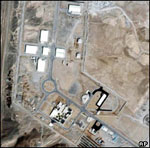 Wall Street Journal: Mounting evidence over the last few years has convinced most experts that Iran has an active program to develop and construct nuclear weapons. Amazingly, however, these experts do not include the leaders of the U.S. intelligence community.
Wall Street Journal: Mounting evidence over the last few years has convinced most experts that Iran has an active program to develop and construct nuclear weapons. Amazingly, however, these experts do not include the leaders of the U.S. intelligence community.
The Wall Street Journal
CIA censors prevented me from naming the outside reviewers who rubber stamp agency estimates.
Opinion
By FRED FLEITZ
 Mounting evidence over the last few years has convinced most experts that Iran has an active program to develop and construct nuclear weapons. Amazingly, however, these experts do not include the leaders of the U.S. intelligence community. They are unwilling to conduct a proper assessment of the Iranian nuclear issue—and so they remain at variance with the Obama White House, U.S. allies, and even the United Nations.
Mounting evidence over the last few years has convinced most experts that Iran has an active program to develop and construct nuclear weapons. Amazingly, however, these experts do not include the leaders of the U.S. intelligence community. They are unwilling to conduct a proper assessment of the Iranian nuclear issue—and so they remain at variance with the Obama White House, U.S. allies, and even the United Nations.
The last month alone has brought several alarming developments concerning Tehran’s nuclear program. International Atomic Energy Agency (IAEA) chief Yukiya Amano said last month that his agency has new information pointing to the military ambitions of Iran’s nuclear program. As of today, Iran has over 4,000 kilograms of low-enriched uranium—enough, according to the Wisconsin Project on Nuclear Arms Control, for four nuclear weapons if enriched to weapons grade.
Iran has accelerated its production of low-enriched uranium in defiance of U.N. and IAEA resolutions. It has also announced plans to install advanced centrifuge machines in a facility built deep inside a mountain near the city of Qom. According to several U.S. diplomats and experts, the facility is too small to be part of a peaceful nuclear program and appears specially constructed to enrich uranium to weapons grade.
To top this off, an item recently posted to the Iranian Revolutionary Guard Corps website mused about the day after an Iranian nuclear test (saying, in a kind of taunt, that it would be a “normal day”). That message marked the first time any official Iranian comment suggested the country’s nuclear program is not entirely peaceful.
Despite all this, U.S. intelligence officials are standing by their assessment, first made in 2007, that Iran halted its nuclear weapons program in 2003 and has not restarted it since.
In February, the 17 agencies of the U.S. intelligence community issued a highly classified National Intelligence Estimate updating their 2007 assessment. That estimate had been politicized by several officials who feared how President George W. Bush might respond to a true account of the Iranian threat. It also was affected by the wave of risk aversion that has afflicted U.S. intelligence analysis since the 2003 Iraq War. Intelligence managers since then have discouraged provocative analytic conclusions, and any analysis that could be used to justify military action against rogue states like Iran.
I read the February 2011 Iran NIE while on the staff of the House Intelligence Committee. I believe it was poorly written and little improvement over the 2007 version. However, during a pre-publication classification review of this op-ed, the CIA and the Office of the Director of Intelligence censored my criticisms of this analysis, including my serious concern that it manipulated intelligence evidence. The House Intelligence Committee is aware of my concerns and I hope it will pursue them.
Censors also tried to prevent me from discussing my most serious objection to the 2011 Iran NIE: its skewed set of outside reviewers. The U.S. intelligence community regularly employs reviewers who tend to endorse anything they review: former senior intelligence officers, liberal professors and scholars from liberal think tanks. These reviewers tend to share the views of senior intelligence analysts, and they also want to maintain their intelligence contacts and high-level security clearances.
I believe that senior intelligence officials tried to block me from naming the NIE’s outside reviewers because the names so strongly suggest that intelligence agencies took no chances of an outside reviewer unraveling the document’s poorly structured arguments and cavalier manipulation of intelligence.
I have been permitted to say the following about the outside reviewers: Two of the four are former CIA analysts who work for the same liberal Washington, D.C., think tank. Neither served under cover, and their former CIA employment is well known. Another reviewer is a liberal university professor and strong critic of George W. Bush’s foreign policy. The fourth is a former senior intelligence official. Not surprisingly, the 2011 NIE included short laudatory excerpts from these reviewers that offered only very mild criticism.
It is unacceptable that Iran is on the brink of testing a nuclear weapon while our intelligence analysts continue to deny that an Iranian nuclear weapons program exists. One can’t underestimate the dangers posed to our country by a U.S. intelligence community that is unable to provide timely and objective analysis of such major threats to U.S. national security—or to make appropriate adjustments when it is proven wrong.
If U.S. intelligence agencies cannot or will not get this one right, what else are they missing?
Mr. Fleitz retired this year after a 25-year career at the CIA, DIA, State Department and House Intelligence Committee staff. He now writes for Newsmax.com. This op-ed was amended to obtain classification clearance from the CIA and the Office of the Director of National Intelligence.


